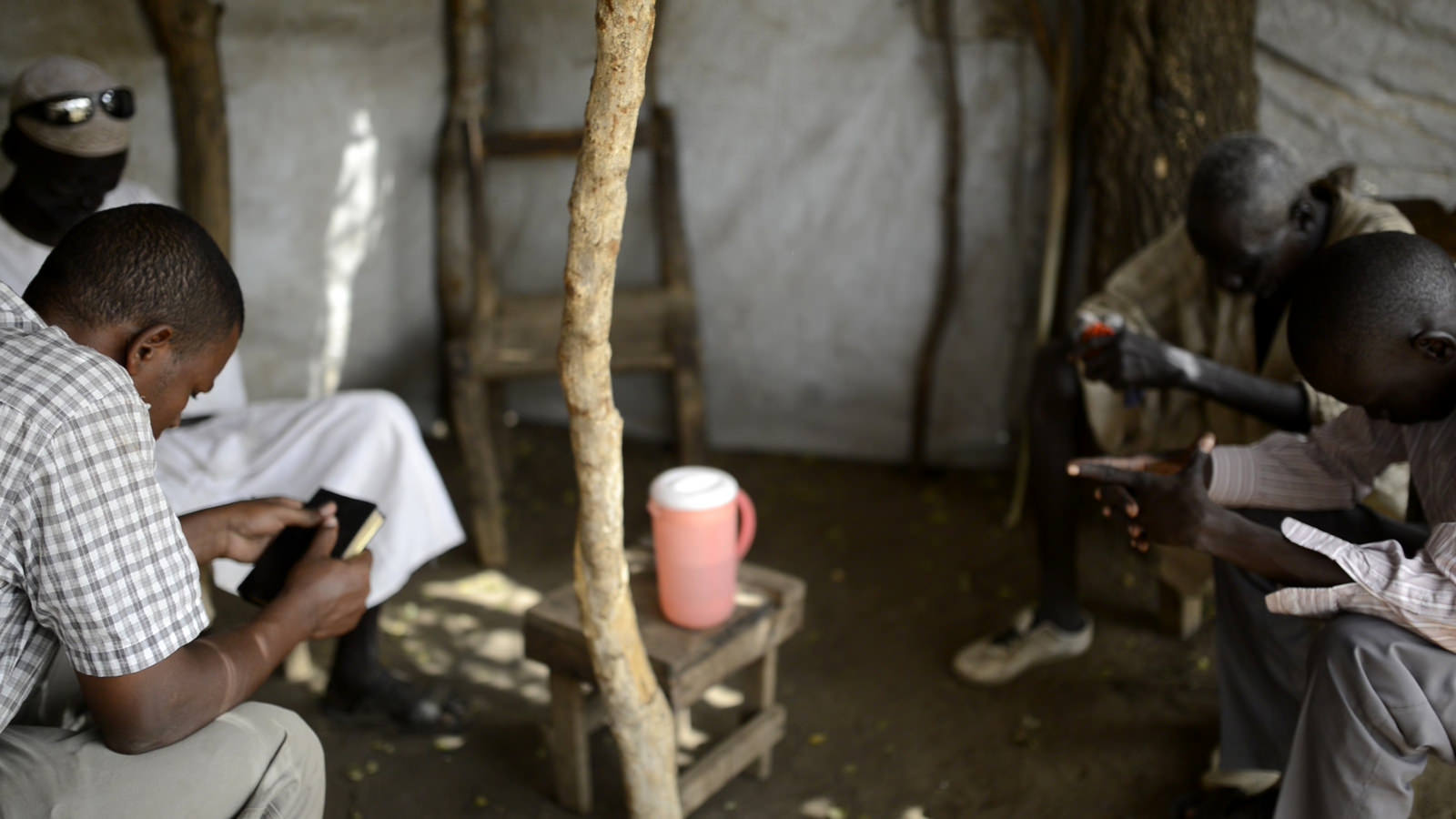An audience of 150,000 and growing
By Tim Coleman | Sudan and South Sudan in East Africa

Hailing from Ethiopia, Getachew and his wife Tibarek were sent by their home church in Ethiopia to South Sudan where they serve with SIM as evangelists in Doro, Maban County. They make a mean cup of coffee, the Ethiopian way, naturally. Doro village is home to the Mabaan people who number up to 50,000. But since 2011, the population here has skyrocketed, as many have fled the civil war taking place in the neighbouring counties of Sudan. Today, the population in Doro village and the surrounding refugee camps is more than 150,000.
For gifted evangelists such as Getachew, the movement of 16 different Sudanese tribes from hard to reach areas into a single refugee area, presents a wonderful opportunity. It's an opportunity to share the gospel of Jesus Christ with many more people.
Getachew takes this opportunity on a daily basis. From similar cultures, Getachew and Tibarek have connected with Sudanese quickly.

Talking with the couple, I hear miraculous testimonies of people coming to Christ - seemingly a daily occurrence. The stories are a testament to the power of God and the perseverance of his people like Getachew. Every day Getachew rides a motorbike cross-country into the villages and camps, his Arabic Bible and small picture Bible in hand. Sitting on the back of the bike with him, I catch a glimpse of what the conditions are like in the camps close to Doro - densely packed with temporary shelters.
Getachew is well known in the area. Most people we pass while criss-crossing through tented avenues share a knowing wave or nod. He intently scans the terrain packed with UN-labeled shelters, searching for signs of people being at home. Before the midday heat has set in, we have already stopped to talk with four different families - some he has met before, others are new to him. These families are from different regions and are either Muslim or from an African Traditional Religion (ATR).
Each time we stop we are greeted warmly. We sit together, as is the custom, and then engage in conversation. Despite the warm welcome, Getachew informs me as we walk away that they have no interest in Christianity. Friendly as the conversations in Arabic appeared to be, there was no "success" that day.
"There are 16 different tribes that I see here in the camps," Getachew says. "Some say 'we don't need' when I share the gospel with them. Others are more open."
Knock-backs are regular fare here. For every "success" story there are plenty of rejections. While we are encouraged to hear many stories of people coming to Christ, these have happened over three years with a daily commitment to the place and people.
As refugees, many people are out of work. They are out of their home contexts, in a place of brokenness and living in hardship, all in close proximity with many others in a similar situation. Despite the hardships, ministering to these people outside of their home contexts is generally more straightforward, as people are more open to strangers and at home more often.
The gospel brings good news (Isaiah 52)
Two years back, Getachew met a man from the Jumjum tribe who was very sick. He prayed with him and left. More than a year later they crossed paths again and the man excitedly told Getachew of the healing miracle he experienced after their prayers. He expressed his desire to follow the God who healed him.
As a Muslim, the man's wife was very closed to the idea of following this healing God. It caused a large rift in the family and tempted the man to deny what had happened to him. However, God kept appearing to the man in dreams, challenging him to follow "the way, the truth and the life," so the man remained faithful. Today, his wife and children have also come to follow Christ.
Getachew notes fear as a major challenge for people coming to faith. Fear of their families and elders rejecting them if they follow Christ.
But where fear takes place, perfect love casts out fear (1 John 4:18)
Last year, a group of youth from the Ingessana tribe searched for Getachew — known as 'the man who shares the truth about Jesus.' The group presented a letter to him, stating that they wanted to accept Jesus as Lord. And to be taught by SIM missionaries. And for churches to be built. And they would stand up for their faith. Since this time, more than 150 people from this tribe are now regularly part of a Christian community across three different camps.

I attend a church service among these youth over the weekend. Under the shade of a grass roof swaying in the breeze, we sing songs together in Arabic. For most Ingessana, this is the first time to use song as a means to worship God. We sway to the beat of a drum constructed from a mortar shell. We sing along to a Sudanese guitar using a bullet shell to stretch the strings into place. It's poetic that items intended for destruction are used in the worship of God.
We share God's word together and there are a handful of Bibles to go around. There is a long pause while people find the verses — this is all new to them.
People from another tribe who had been in conflict with the Ingessana came to the church that weekend. Under the beating sun, the two tribes came together in a sign of unity. It was a monumental moment for our gospel of peace. What a challenge and privilege for Getachew to walk alongside the Ingessana and others as they explore their newfound faith.
Set against a backdrop of challenging circumstances, there is much cause to be optimistic here in Doro. Many are open to discussion with Christians for the first time and there are a number of new believers desiring to be discipled. Missionaries like Getachew and Tibarek, from neighbouring countries, can speak the common language and are familiar with the culture. They are playing a major role in sharing the good news of the gospel.

Pray for:
• opportunities SIM missionaries have to share the gospel in Doro.
• the tribes that are resistant to the gospel.
• the safety of the team in Doro. The harvest is plentiful but the workers are few and more missionaries are needed to join the SIM South Sudan team.
This story first appeared on simstories.org.
Related stories

Doro Clinic outreach programmes reach the forgotten with care and the gospel
In South Sudan’s Maban County, medical teams from SIM’s Doro Clinic are reaching refugees who can’t reach them, bringing healing, hope and the gospel to the sick, the stigmatised and the overlooked.

Today for Tomorrow is rooting the next generation in Christ across Southern Africa
Today for Tomorrow began with just five children when SIM mission worker Graham, Jessie and Chris Maphosa saw a gap in how children were being discipled. While serving in Zimbabwe, Chris and colleagues developed the T4T training programme to help pastors and teachers share Christ-centered lessons in ways children could understand. Today, the ministry has grown significantly and continues to shine across the region.

Our call to care for the planet goes beyond recycling: lessons on creation stewardship
As a child growing up in Canada, I thought recycling was the best way to help the planet. The world’s problems were much too big for us as children, but finally, there was something we could do as well, right from our home. But my understanding of all my efforts were turned on its head when I chatted with Ian Ratcliff, SIM's Ministry Point Person for Creation Stewardship and Care.

